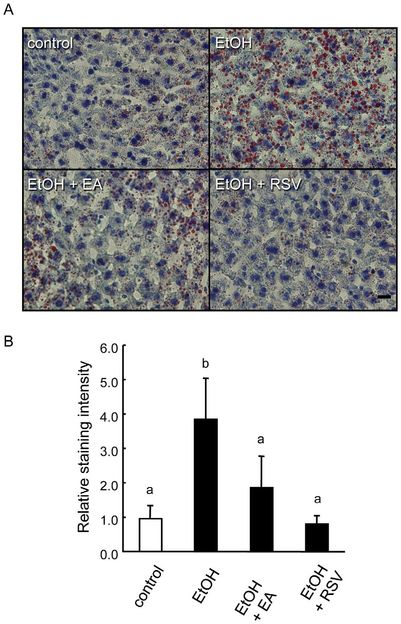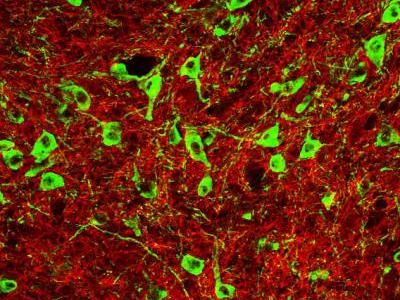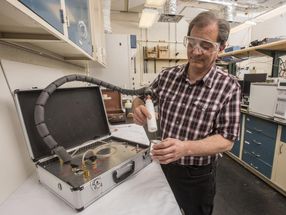Alcoholic drinks contain chemicals that could help suppress alcohol-induced stress.
By identifying the roles and regulatory protein for genes upregulated by polyphenols in wines and spirits, recent research suggests a potential approach for preventing alcohol-induced stress.

Effect of polyphenols on the alcohol-induced fatty liver in the mice. Top: Oil red O staining of the liver sections from the mice fed the control, the ethanol, the ethanol plus ellagic acid, or the ethanol plus trans-resveratrol diet. A larger number of oil drops was observed in the section of the mouse fed the ethanol diet compared with the other sections. Bottom: Quantification of the oil drop intensities per section by image analysis. Differences were observed between the ethanol group (b) and the other groups (a). Scale bar,10 micrometers
“Chronic alcohol intake inflicts progressive damage on energy metabolism, while it causes significant change in hepatic gene expression profile,” explain Takumi Misaka, Akihito Yasuoka and colleagues from the University of Tokyo and Kanagawa Academy of Science and Technology in their latest report. They compared the effects on gene regulation of alcohol administration with and without polyphenols to better understand these processes and identified a possible approach for suppressing alcohol-induced stress.
The researchers fed mice one of four liquid diets: with added ethanol alone; with added ethanol and ellagic acid (EA, a polyphenol found in wood in aged whisky); with added ethanol and trans-resveratrol (RSV, a polyphenol derived from grape peel in wine); and with added water as a control. After five weeks the mice were sacrificed for study, revealing that while administration of ethanol alone led to four times the level of accumulated fatty acid in the liver, administration of EA or RSV with the ethanol reduced this to around the level of the control. Gene expression analysis also highlighted differences in the genes upregulated under administration of alcohol with or without polyphenols that suggest polyphenols may facilitate healthier metabolic processes.
The researchers then investigated the role of a nuclear receptor – constitutive androstane receptor (CAR) – known to respond to plant chemicals like EA and RSV. Gene expression analysis of CAR-deficient mice showed they were not receptive to the ameliorative effects of polyphenols administered with ethanol, suggesting CAR mediates these regulating effects. They conclude their report saying, “Our study provides the molecular basis for the prevention of AFL by polyphenols, which are commonly consumed food factors.”
Original publication
Ruiqing Yao, Akihito Yasuoka, Asuka Kamei, Shota Ushiama, Yoshinori Kitagawa, Tomohiro Rogi, Hiroshi Shibata, Keiko Abe, Takumi Misaka; "Nuclear Receptor-Mediated Alleviation of Alcoholic Fatty Liver by Polyphenols Contained in Alcoholic Beverages."; PLOS ONE, 9, e87142, (2014).
Original publication
Ruiqing Yao, Akihito Yasuoka, Asuka Kamei, Shota Ushiama, Yoshinori Kitagawa, Tomohiro Rogi, Hiroshi Shibata, Keiko Abe, Takumi Misaka; "Nuclear Receptor-Mediated Alleviation of Alcoholic Fatty Liver by Polyphenols Contained in Alcoholic Beverages."; PLOS ONE, 9, e87142, (2014).
Organizations
Other news from the department science

Get the life science industry in your inbox
From now on, don't miss a thing: Our newsletter for biotechnology, pharma and life sciences brings you up to date every Tuesday and Thursday. The latest industry news, product highlights and innovations - compact and easy to understand in your inbox. Researched by us so you don't have to.




















































